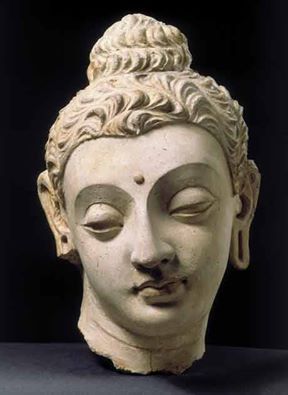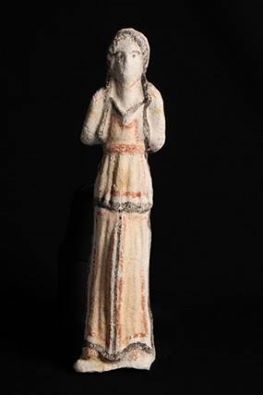In this episode, we look at the brief and abortive Greek attempts to explore and circumnavitage the Arabian coast, with a particular focus on the island of Tylos, its wonderful flora, and its mysterious people.
Episode 5: An absolutely wonderful example of Greco-Buddhist art, which originated through sustained Greek influence in the Indus river valley and Central Asia in the years following Alexander’s death.

Episode 5: Probable location of the ancient trading city of Gerrha. Although the city was noted as being a major transit points for goods coming from India and the East on their way north to the large Mesopotamian population centers, surprisingly little is understood about the city or its inhabitants. Most likely, Gerrha, like nearby Tylos, was a multiethnic and multicultural hub.

Episode 5: Ceremonial burial figurine from the so-called “Middle Tylos” period, in the 1st century BCE, excavated from Shakhoura, Bahrain.
This figure dates from some 200 years after Tylos’ discovery by Alexandrian explorers. Of particular interests here is that the lady depicted is wearing a chiton, or a traditional Greek and Hellenistic tunic, showing that the culture of Tylos came under heavy Greek influence in the centuries following the voyages of Archias, Androsthenes and Hieron to the island.

I’m in the middle of the episode now, but I wanted to leave a comment about a thing before I forgot. At about 11 minutes in, it’s true that Uranus-as-a-planet is visible to the naked eye, but the planet wasn’t named that until a few years after Herschel discovered it. I would have interpreted the quote as being about Uranus-as-god-of-the-heavens instead.
LikeLike
Hi Jake,
That’s an excellent point actually! You’re probably right – I’ll do a mea culpa on this in the next episode. It’s quite interesting because Arrian mentions that he believes the reason why Uranos was venerated by the Arabs was because “it is visible, and contains some of the light of the sun into him” which I interpreted as meaning that people were actually looking up into the night sky and seeing a planet…
LikeLike
Actually, in greek, ouranos just means “sky”, and in bible it is used that way. For exmaple, “o uranos kai e ge” means “sky and earth”, ie, all universe. So, when Arrian said that the Arabs worshipped Ouranos, he most probably just meant that arabs worshipped the sky.
Best, Mehmet.
LikeLike